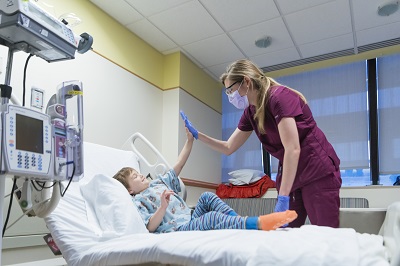
If your child has been scheduled for a urodynamics study, which assesses the bladder and urethra's ability to store and produce urine, it's important that your child arrives prepared.
Guidance for Testing Day
What to bring
- Drinks or snacks
- Soothing aids like a pacifier or stuffed animal
- Distractions like a cell phone, iPad, tablet or books
Prescribed Medication
Give your child all prescribed medications on the day of the test. If your child is taking Ditropan (Oxybutynin Chloride) or any other medicines for their bladder, please give these medicines as prescribed. Do not skip these medicines the morning of the test, as this will alter the results.
If prescribed, continue with current clean intermittent catheterization (CIC) regimen on the day of the test. Please take note of your catheter type and size. Bring a 2-day log of catheter output volumes.
Fever Information
If your child has a fever (greater than 100.4°F) or symptoms of a urinary tract infection. Please call the Urology office at 202-476-5042 as soon as possible to discuss with the nurse/nurse practitioner. The study may need to be rescheduled when your child is well to obtain the most accurate results.
For Spina Bifida patients: please call (202)-476-SPNA (7762)
If you are asked to perform a bowel clean out before your urodynamics test, please refer to the bowel clean out instructions below (page 3 of the PDF).
A Note About Siblings and Caregivers
Please note that we cannot perform video urodynamics testing if siblings or pregnant caregivers are present.
Arrival Instructions
- The test will take place at:
- Children’s National Hospital, Washington D.C.
Colorectal Clinic, 4th Floor of the Main Hospital Building
- Children’s National Hospital, Washington D.C.
- Arrive 30 minutes early to register and to prepare. The test takes 90 minutes to complete
- Please call to let us know if you cannot come. If you arrive late by 30 minutes or more, you may be asked to reschedule

Contact Information
For routine questions about the study, call (202)-476-5042 and ask to speak with the nurse or nurse practitioner. To let us know that you are late or cannot come on the day of your study, call (202)-476-2656.
Q&A: Urodynamic Testing (UDS) Preparation
What is urodynamic testing?
Which conditions do we study with urodynamic testing?
Who does the urodynamic testing?
How is urodynamic testing done?

Bowel Cleanout for Urodynamics
Your child has been scheduled for a Urodynamics study. It is very important that your child arrives to the test free of any constipation (hard poop or stools that do not happen every day). Stool in the colon or rectum may not give you the best test results.
If your child is already on a bowel program, make sure the program is being done daily for 2 days before the test.
If your child is not on a bowel program, give your child Ex-lax chewable at bedtime nightly 2 days before your urodynamics test and a glycerin suppository or fleet enema the night before the test.
The amount of ex-lax given is based on the chart below:
- 2-5 years old: 1 chewable at bedtime for 2 days (Friday night and Saturday night)
- 6-9 years old: 2 chewables at bedtime for 2 days
- 10 years and older: 3 chewables at bedtime for 2 days
If your child can take pills, they may take 5 mg Dulcolax tablets instead of ex-lax
- 6-9 years old: 1 tablets
- 10 years: 2 tablets
If your child prefers liquid, they may take 8.8 mg/5 ml of Senna
- 2-5 years old: 10 ml of Senna
- 6-9 years old: 20 ml of Senna
- 0 years and older: 30 ml of Senna
The pediatric glycerin suppository or a fleet enema amount given the night before the test is based on the chart below:
- Infant (1-12 months): give on pediatric glycerin suppository
- Children 2-4 years of age: give half (1/2) of 2.25 ounce of a pediatric fleet enema (Sunday night)
- Children 5-11 years of age: give 1 entire 2.25 ounce pediatric fleet enema
- Children 12 year and older: give 1 entire 4.5 ounce enema
Urodynamic Testing Instructions
Download the instructions in English and Spanish below.




